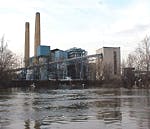The attorneys general of six Northeast states filed a lawsuit yesterday against the Environmental Protection Agency over a July 9 change to rules governing water use by power plants, claiming the change fails to adequately protect the states' water and fishery resources.
Rhode Island is the lead plaintiff in the lawsuit, filed in the 1st U.S. Circuit Court of Appeals in Boston. The suit claims the rule makes it easier for existing power plants to avoid installing effective technologies to help reduce the amount of water taken from oceans, bays and rivers – degrading water quality and harming the environment.
The attorneys general have asked the court to review the change and stop the rule from going into effect until the petition has been resolved.
The other states involved in the litigation are New York, New Jersey, Connecticut, Delaware and Massachusetts.
Cynthia Bergman, an EPA spokeswoman, said the new rule marks the first time the agency has established national guidelines under the Clean Water Act to protect fish and other aquatic animals from death or harm.
"The benefits are enormous, (and) we will vigorously defend this rule," she said in a statement.
The Clean Water Act requires power plants to obtain permits for their water discharges. The permit also sets the amount of cooling tower water the plants can take in from public sources. The law requires cooling water intake structures to "reflect the best technology available for minimizing adverse environmental impact."
The attorneys general claim EPA has modified the rules by lending a more receptive ear to those concerned with the costs of upgrading to closed-cycle technology, which reduces the total amount of water plants require. The majority of plants have a once-through cooling system with no recycling capabilities.
The new rule states plants can "get relief" from such technology if the costs are "wholly disproportionate" to the benefits.
Rhode Island has long battled with the Brayton Point power plant in Somerset, Mass., over its intake of water from Mount Hope Bay (shared by the two states) and its heated discharges into it.
Rhode Island Attorney General Patrick Lynch blames the coal-fired plant's intake of water from Mount Hope Bay for causing a drop in the fish population and for harming the bay. Many environmental organizations share his view.
Source: The Worcester Telegram & Gazette, The Associated Press


